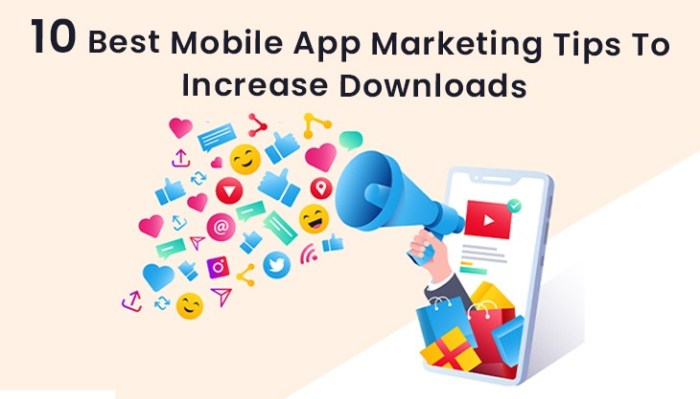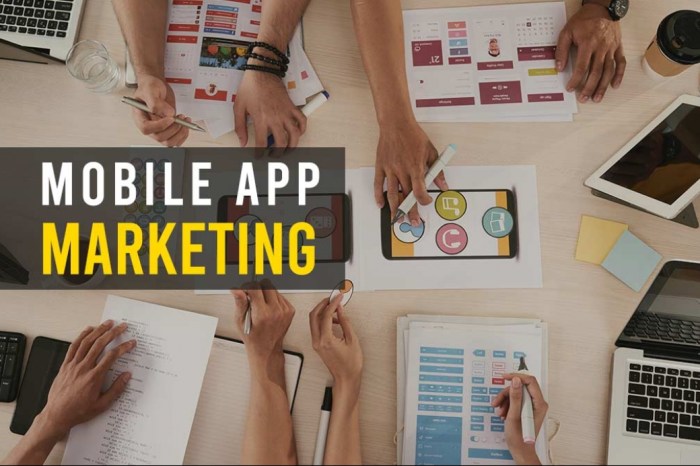Kicking off with Mobile App Marketing Tips, this opening paragraph is designed to captivate and engage the readers, setting the tone for a hip and informative discussion. In today’s digital age, having a solid marketing strategy for your mobile app is key to standing out in a crowded market. From understanding your target audience to utilizing the right engagement techniques, this guide will provide you with the essential tips to elevate your app’s visibility and success.
Importance of Mobile App Marketing

In today’s digital age, mobile app marketing plays a crucial role in the success of any app. With millions of apps available in the app stores, it is essential to stand out and reach your target audience effectively through marketing strategies.
Effective mobile app marketing can significantly impact user acquisition and retention rates. By creating a strong brand presence, engaging with users through various channels, and utilizing data-driven insights, app developers can attract new users and keep them coming back for more.
Examples of Successful Mobile App Marketing Campaigns
- Pokemon Go: With its innovative use of augmented reality technology and strategic partnerships, Pokemon Go became a global phenomenon, attracting millions of users worldwide.
- TikTok: Through influencer collaborations, viral challenges, and personalized content recommendations, TikTok rapidly grew its user base and became one of the most popular social media platforms.
- Starbucks Rewards: By offering exclusive deals, personalized offers, and a seamless mobile app experience, Starbucks increased customer loyalty and engagement through its rewards program.
Strategies for Mobile App Marketing
When it comes to promoting a mobile app, there are several strategies that can help increase visibility and drive downloads. From App Store Optimization (ASO) to social media marketing, each approach plays a crucial role in reaching your target audience.
Importance of App Store Optimization (ASO)
App Store Optimization (ASO) is essential for ensuring that your mobile app ranks well in app store search results. By optimizing s, descriptions, and visuals, you can improve your app’s visibility and attract more users.
Remember, the higher your app ranks in app store search results, the more likely users are to discover and download it.
Role of Social Media Marketing
Social media marketing is another key strategy for promoting mobile apps. By creating engaging content, running targeted ads, and collaborating with influencers, you can increase awareness and drive downloads of your app.
Target Audience Analysis

Understanding the target audience is crucial in mobile app marketing to ensure that your efforts are reaching the right people and resonating with them effectively.
Significance of Target Audience Analysis
- Identifying the demographics, interests, and behaviors of your target audience helps tailor your marketing strategies to meet their specific needs and preferences.
- By understanding your target audience, you can create personalized experiences that engage users and drive conversions.
- Target audience analysis allows you to optimize your marketing budget by focusing on the channels and messages that are most likely to resonate with your ideal users.
Methods for Conducting Target Audience Analysis
- Utilize analytics tools to gather data on user demographics, behavior patterns, and preferences.
- Conduct surveys and interviews to gain insights directly from your target audience.
- Monitor social media interactions and engagement to understand how users are interacting with your brand.
- Utilize A/B testing to experiment with different messaging and approaches to see what resonates best with your target audience.
Benefits of Personalized Marketing
- Personalized marketing allows you to create targeted campaigns that speak directly to the individual needs and preferences of your target audience.
- By delivering personalized content, offers, and recommendations, you can increase user engagement and loyalty.
- Personalized marketing can lead to higher conversion rates as users are more likely to respond to messages that are relevant to their interests and behaviors.
User Engagement Techniques: Mobile App Marketing Tips
User engagement is crucial for the success of a mobile app. By keeping users actively involved and interested, you can increase retention rates and drive customer loyalty. Here are some techniques to enhance user engagement within a mobile app:
Importance of Push Notifications and In-App Messaging
Push notifications and in-app messaging are powerful tools for engaging users. Push notifications allow you to send real-time updates and reminders to users, keeping them informed and engaged. In-app messaging provides a direct channel of communication with users, allowing you to deliver personalized messages and prompts. By utilizing these features effectively, you can keep users engaged and encourage them to interact with your app on a regular basis.
- Send personalized notifications based on user behavior and preferences.
- Use in-app messaging to guide users through new features or promotions.
- Offer exclusive deals or rewards through push notifications to incentivize user engagement.
Successful User Engagement Strategies, Mobile App Marketing Tips
Many popular mobile apps have implemented successful user engagement strategies to keep their users active and loyal. Here are some examples:
Instagram: Utilizes push notifications to alert users about new likes, comments, and followers, keeping them engaged with the platform.
Spotify: Sends personalized recommendations and playlists to users through push notifications, encouraging them to discover new music and engage with the app.
Amazon: Utilizes in-app messaging to provide order updates, delivery notifications, and personalized product recommendations, enhancing the user experience and driving engagement.
Metrics and Analytics
In the world of mobile app marketing, tracking metrics and analytics is crucial for understanding the performance of your app and marketing efforts. By analyzing data, you can make informed decisions to optimize your strategies and improve user engagement.
Key Performance Indicators (KPIs)
- App downloads: Measure the number of downloads to gauge the popularity of your app.
- User retention rate: Track how many users continue to use your app over time.
- Conversion rate: Monitor the percentage of users who complete a desired action, such as making a purchase.
- Retention cost: Calculate how much it costs to retain users and compare it to the lifetime value of those users.
- App store ratings and reviews: Monitor user feedback to assess app satisfaction and make improvements.
A/B Testing for Optimization
A/B testing involves comparing two versions of a marketing element, such as a landing page or ad creative, to see which performs better. By using analytics to analyze the results, you can make data-driven decisions to optimize your mobile app marketing strategies. This iterative process allows you to continuously improve and refine your approach based on user behavior and preferences.